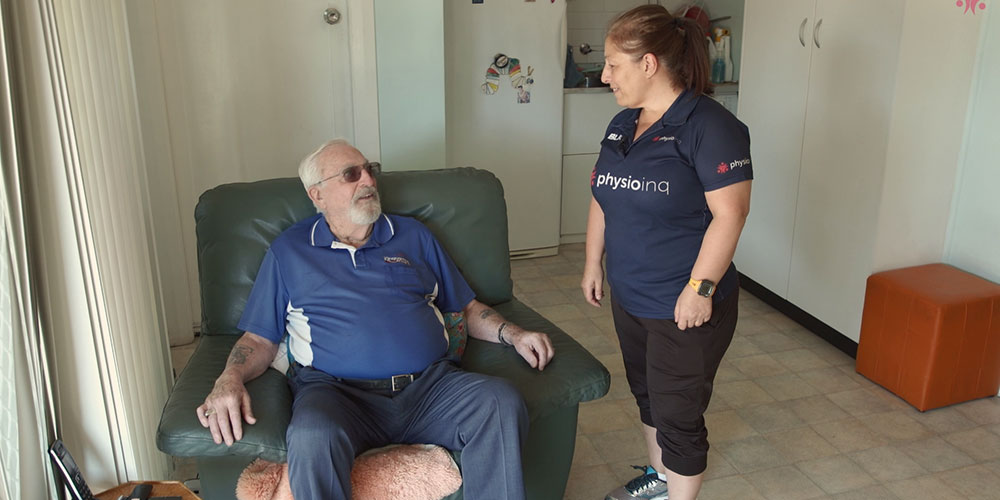Make an Appointment
Many people experience chronic neck pain for a variety of reasons. From constantly looking down at our smartphones to sitting at desks all day to sports injuries and more, neck pain is common, but doesn’t have to be permanent.
If you’re wondering, “Is physiotherapy good for neck pain?”, the short answer is yes, seeing a physio for neck pain is one of the best things you can do to have a more pain-free existence.
But, if you want a bit more information about when physiotherapy treatment for neck pain the best route for you is, keep reading.
Here, we’re going over what it means if you have neck pain and its potential causes, some of the most common neck injuries you might be experiencing and how booking an appointment with a physiotherapist can help.
What does it mean if I have neck pain?
It is said that neck pain is one of the most common musculoskeletal conditions on a global scale - 2021 Global Year About Back Pain Fact Sheet. Furthermore to this research prevalence in neck pain for both females & males peak around the ages of 50 years.
If you’re experiencing neck pain, it could be caused by a lot of different problems. Pain and stiffness in your neck might be coming from muscles, tendons or ligaments or could be caused by issues with spinal discs and nerves.
Your neck pain may also be coming from an issue with your shoulders, upper back or even your jaw. In other words, the root cause of neck pain isn’t always clear.
Apart from neck pain itself, these issues can also cause headaches at the back of the head, eyes or around the front of the head and temples.
Neck pain therefore can be extremely debilitating which is why seeing a physio for neck pain can help you get back to life.
What causes neck pain?
To help you find the root cause of your neck pain, your physio might ask you some of the following questions:
- Do you often sleep on your stomach or find it most comfortable to lie on your stomach?
- Do you spend a lot of time looking at small screens like phones and tablets?
- Do you work from a desk?
- Do you carry a heavy bag on one shoulder or carry a briefcase in one hand daily?
If you answered yes to some or all these questions, you’re likely experiencing some sort of neck pain. That’s because sleeping on your stomach, desk jobs, screentime and the way you carry your bags often cause neck pain for many people.
However, neck pain can also be caused by postural issues, past injuries, and muscular imbalances. When you seek a local physiotherapist for neck pain, they’ll help you better understand the root cause of your neck pain and how to best treat it.
What are the most common neck pain injuries?
Some of the most common neck injuries that might be causing your constant neck pain include:
- Acute wry neck
- Bulging discs
- Whiplash
- Postural-related neck pain
- Work-related neck pain
Acute wry neck: Also known as a “crick” in your neck. These usually occur upon waking up after sleeping in an awkward position, lifting something heavy or turning your head too quickly in an awkward way. The result is a stiff, locked feeling with sharp pains when you try to move your neck in a certain direction.
Bulging discs: Occur either due to age, poor posture, repetitive activities, heavy lifting, or an injury. Bulging discs can cause nerve irritation which leads to neck pain and sometimes a tingling sensation in your shoulder and arm.
Whiplash: An injury that happens when your head is forcibly thrown forwards or backwards, overstretching the muscles, ligaments, and tendons of the neck. Often the result of a car accident, whiplash can cause neck pain, stiffness and headaches and requires treatment to prevent long-term repercussions.
Postural and work-related neck pain: Caused by sitting or standing in awkward positions, extended periods of sitting, repetitive hand, or finger movements such as typing and not using ergonomic furniture. This type of neck pain usually comes on gradual but can lead to long-lasting issues.
The good news is all these types of neck pain can be treated with physiotherapy.

How long does neck pain last?
The answer is: it depends.
Before we talk about how physiotherapy treatment for neck pain can help your neck pain from recurring, let’s go over how long neck pain is likely to last.
If your neck pain is the result of a muscle strain, sprain, or another sort of specific injury, with proper care and rest, your neck is likely to heal completely in only a matter of weeks. But keep in mind that your injury will last longer if you don’t rest, ice and work on healing it.
On the other hand, if your neck pain is chronic and is a result of lifestyle habits, it could take a lot longer for your neck pain to go away. It’s likely to take months to retrain your body to hold itself properly, use the correct muscles to keep things aligned, break bad habits and strengthen or mobilise any surrounding muscles or joints that may have been causing the neck pain.
When you see a physio for neck pain, you’ll get started with a personalised treatment plan so you’ll know exactly how long you should expect your neck pain to last and when they expect you’ll be pain-free.
How can I permanently relieve neck pain?
Yes, in most cases it’s possible to permanently relieve neck pain. But again, this still depends on the root cause of your neck pain.
However, if you get physiotherapy treatment for neck pain and your physio agrees that your neck pain is caused by something that can be adjusted or healed, then yes, neck pain can be permanently “cured”.
Just keep in mind that it’s up to you to implement your physio exercises regularly and to book consistent appointments to make sure that your body isn’t falling into old habits – ones that may have been causing your neck pain in the first place.
In short, seeing a physiotherapist for neck pain won’t instantly solve your neck problems forever. It takes work on your part to make sure that your physiotherapy treatment offers long-lasting benefits and relief.
Does physio help neck pain?
Yes, seeing a physio for neck pain can certainly help with your symptoms. Physiotherapists have expert knowledge in the way your anatomy and physiology work and can quickly understand what might be causing your neck pain and how to effectively treat it.
By working with you on personalised exercises and tips to take home into your everyday life, physiotherapy treatment for neck pain might include things like:
- Neck exercises and stretches
- Hot and cold therapy
- Remedial massage
- Cupping
- Dry needling
- Postural devices
- Assisted stretching
When you see a physio for your neck problems, they’ll go over your health history, day-to-day habits and activities, activity levels and more to figure out the source of your neck pain. From there, they’ll decide on one of the treatment options and take it from there.
Physiotherapy is extremely individualised, and one client’s appointment may look far different to another. So, the only way to really find out how physiotherapy works to help your neck pain is by booking an appointment and trying it for yourself.
When should I see a physio for neck pain?
You should seek physiotherapy for neck pain as soon as the pain is noticeable for more than a week.
Often, we let our little aches and pains go way too far before we seek professional help. By then, the problem is often exacerbated and waiting too long can make it even more difficult to find the real cause of the issue.
Plus, if your neck pain is caused by a bad habit with your posture or daily activities, waiting too long can make it difficult to reverse those habits and relieve your pain.
So, when your neck pain becomes noticeable for more than a week, go to see a physio for your neck pain as soon as possible.
How do you do neck physiotherapy?
To do neck physiotherapy, you first need to book a physiotherapy appointment. From there, your physio will complete an assessment and work with you to create a personalised treatment plan for your neck pain.
Most often, this involves a series of exercises and stretches to relieve the tension in your neck. Aside from performing these exercises at your physio appointments, you’ll also want to do your neck physiotherapy at home using the techniques you learned.
It’s safest to always follow the exact instructions of your physio when doing physiotherapy at home. If something feels off, stop the exercise, and ask about the issue at your next appointment.
What are some good exercises for neck pain?
Most exercises to relieve neck pain are gentle stretches that can help to release tension in your neck muscles. However, neck strengthen exercises can also help you to stabilise your neck and offer further pain relief.
Some of the best physiotherapy exercises for neck pain include:
- Forward neck tilts
- Side to side neck tilts
- Side to side neck turns
- Chin tucks
- Isometric neck strengthening exercises
Forward Neck Tilts
- Start either sitting with your back straight or standing tall.
- Keeping your collar bones broad, gently tilt your head forward, bringing your chin towards your chest.
- Hold for 5 seconds before returning to neutral.
- Repeat 10 times.
Keep in mind that while many people do this stretch by also tilting their heads up and looking to the sky, sometimes this can create crunching in the back of the neck.
If it feels good in your body to tilt your neck backwards, keep as much space in the back of the neck as possible by thinking of reaching your nose towards the sky with your neck staying long.
Side to Side Neck Tilts
- Start either sitting with your back straight or standing tall.
- Keeping your shoulders pressing down and without moving your torso, tilt your head to one side, bringing your ear towards your shoulder.
- Hold for 5 seconds before returning to neutral.
- Repeat on the other side and continue for 10 rounds.
Side to Side Neck Turns
- Start either sitting with your back straight or standing tall.
- Keeping your shoulders pressing down and without moving your torso, turn your head to one side so that you’re looking in that direction.
- Hold for 5 seconds before returning to neutral.
- Repeat on the other side and continue for 10 rounds.
Chin Tucks
- Start either sitting with your back straight or standing tall.
- Keeping your collarbones broad and your shoulders pressing down, gently tuck your chin towards your throat without looking down.
- Hold for 5 seconds before returning to neutral.
- Repeat 10 times.
Isometric Neck Strengthening Exercises
- Start either sitting with your back straight or standing tall.
- Press your hand gently into the side of your head near your temples.
- Offer some resistance with your hand and press your head into your hand for 5 seconds to strengthen you neck muscles.
- Repeat on the other side, on the back and on the front of your head. Continue for 5 rounds.
If you’re interested in learning more exercises for neck pain that are personalised to you and your body, be sure to book an appointment with a physiotherapist who can assess your unique circumstances.
Still worried about your neck pain. Ready to finally book an appointment to get physiotherapy treatment for your neck pain?
Physio Inq provides expert physiotherapists to work with you on a personalised treatment plan to help you reduce and hopefully eliminate your neck pain once and for all.
With mobile services and convenient locations all over Australia, contact Physio Inq today!
Date Published: Thursday, January 20, 2022
Locate a Mobile Physiotherapy
Service Near me
Get the experience & convinence you deserve to support your or a loved one's allied health needs.
Our Mobile Physiotherapy team are currently serving & taking appointments in the following states and regions in Australia:
Need to get into direct contact with ur Client Services team? We're all ears. Call our team directly on 1300 731 733











